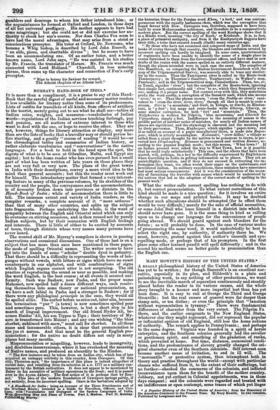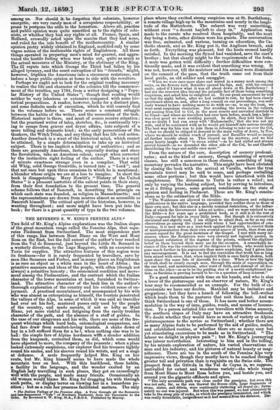MARY HOWITT'S HISTORY OF THE UNITED STATES. * A B.EALLY philosophical
history of the United States of America has yet to be written ; for though Bancroft's is an excellent nar- rative, especially in its plan, and Hildreth's is a plain and painstaking work, to say nothing of other productions, we want to see the inevitable march of separation continuously and steadily placed before the reader in its various causes, and the -whole story brought to a keener and more impartial test than has yet been done. It is easy to rail at George the Third and George Grenville ; but the real causes of quarrel were far deeper than stamp acts, or tea duties ; or even the principle that "taxation without representation is tyranny." There were fundamental differences of character from the very outset. The Pilgrim Fa there, and the earlier emigrants to the New England States, whatever else they might represent, did not represent the popular or influential opinion of old England, still less the home notions of authority. The remark applies to Pennsylvania ; and perhaps to the same degree. Virginia was founded in a spirit of heroic enterprize, and the Southern colonies generally had the cavalier or gentleman spirit, and something of the gradation of ranks, which prevailed at home. But time, distance, economical condi- tions, and the predominance of slavery greatly changed the ori- ginal character even of the Southern colonists. Self interest soon became another cause of irritation, to end in ill will. The " mercantile " or protective system, then triumphant both in theory and practice throughout the world—except with particular classes who suffered from it, to the extent of their sufferings, but no further—checked the commerce of the colonists, and inflicted inconvenience upon them for the benefit of the mother country. Jobbery, not yet extinct in Colonial appointments, was in those days rampant ; and the colonists were regarded and treated with an indifference or open contempt, some traces of which yet linger • A Popular History of the United States of America ; from the Discovery of the American Continent to the Present Time. By Mary Howitt. In two volumes, Published by Longmans and Co. among us. Nor should it be forgotten that colonists, however energetic, are very rarely men of a scrupulous respectability, or prone to postpone the utile to the honestum. Above all, practice and public opinion were quite unsettled as to the rights of colo- nists, or whether they had any rights at all. France, Spain, and Holland, avowedly acted upon the maxim that they had none, and ruled for the sole benefit of the mothercountry. A similar opinion Pretty widely obtained in England, modified only by some vague notion of the inalienable rights of Englishmen. All these things operated in preparing men's mind for quarrel, and aggra- vated the hostile feeling when war broke out, quite as much as the actual measures of the Ministry, or the obstinacy of the King. The ill repute into which George the Third had fallen by his alleged tyranny, and the court corruption of his " friends " might, however, frighten the Americans into a strenuous resistance, and induce a large public' opinion at home to side with the revolters.
Perhaps we ought not to look for the original reading necessary
' to realize the life and character of the colonies till the commence- ment of the troubles' say 1764, from a writer designing a " Popu- lar History of the United States "; though that reading would neither be very laborious or extensive compared • with some his- torical preparations. A reader, however, looks for a distinct plan, and some definite mode of execution, which he will scarcely find in the volumes before us. There seems a constant struggle between the habits of the writer, and the necessities of the task. Historical matter is there, and must of course receive attention; but the practised writes of tales, sketches, &c., is continually try- ing to escape from graver and dryer affairs, into subjects of a more telling and dramatic hind; as the early persecutions of the Quakers, the Witch Trials, and any-thing that has life and action. Another drawback is a want of the historical mind, which cannot be attained, by a simple determination to take up an historical subject. There is too implicit a following of authorities; and as these are generally American, facts, especially during and since the Revolution, take an American colour, except when corrected by the instinctive right feeling of the author. There is a want of minute exactness strange even in a compiler. That solid. old Whig, solid George Grenville, is turned into a "Lord"; and that not once but upon three occasions in which he is mentioned ; a blunder whose origin we are at a loss to imagine. In short the book is disappointing. Mary Howitt's "History of the United., States" is a pleasant narrative of the salient points in their story, from their first foundation to the present time. The general scheme follows that of Bancroft, in describing the principle on which each state was founded, as religion in Massachusetts ; and the representations are drawn from sources almost as accessible as Bancroft himself. The critical spirit of the historian, however, is wanting throughout ; and more might have been put into ihe book; for there is a great quantity of type in the two volumes.



























 Previous page
Previous page